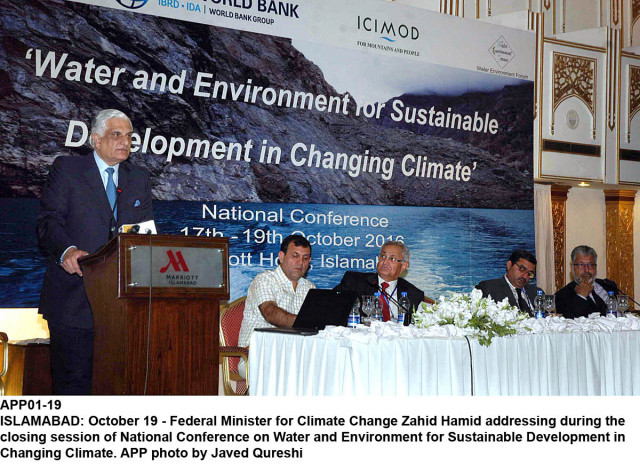Annual cost: Pakistan needs $14b for climate impact adaptation
Pakistan contributed only 0.8% of total annual global greenhouse gas emissions, ranking 135th in the world

Separately, speaking at the concluding session of the 13th annual meeting of the Regional Consultative Committee, Hamid said that the nature of challenges faced by the region is complex, multi-dimensional and transnational. PHOTO: ONLINE
He said this while a parallel regional moot on climate change presented an 11-point declaration to mitigate disaster risks.
Addressing the concluding session of a three-day national conference on ‘Climate Change Challenges and Pakistan’ at a local hotel here on Wednesday, Hamid said the MOCC had developed a National Climate Change Policy (NPCC) and National Disaster Risk Reduction Policy (NDRRP).
He maintained that the adverse impacts of climate change in Pakistan were of immense concern as Pakistan contributed only 0.8% of total annual global greenhouse gas emissions, ranking 135th in the world.
“According to the Global Climate Risk Assessment Index developed by German Watch, Pakistan ranked eighth among the countries most vulnerable to climate change from 1992-2011, and third most affected for the year 2011,” he said.

The conference was organised by Ministry of Climate Change (MOCC) in collaboration with Water Environment Forum (WEF), World Bank (WB) and International Centre for Integrated Mountain Development (ICIMOD).
Separately, speaking at the concluding session of the 13th annual meeting of the Regional Consultative Committee, Hamid said that the nature of challenges faced by the region is complex, multi-dimensional and transnational.
The meeting ended with the Islamabad Statement, which called upon the RCC Secretariat, UN organisations, development partners, and other relevant stakeholders to develop an integrated macro-level tool to monitor the implementation of the three key global frameworks, leverage RCC as a regional mechanism to implement the frameworks.
Published in The Express Tribune, October 20th, 2016.




1724319076-0/Untitled-design-(5)1724319076-0-208x130.webp)














COMMENTS
Comments are moderated and generally will be posted if they are on-topic and not abusive.
For more information, please see our Comments FAQ